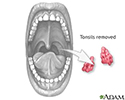Tonsil removal - what to ask your doctor
What to ask your doctor about tonsil removal; Tonsillectomy - what to ask your doctor
Your child may have throat infections and need surgery to remove the tonsils (tonsillectomy). These glands are located at the back of the throat. The tonsils and the adenoid glands can be removed at the same time. The adenoid glands are located above the tonsils, in the back of the nose.
Below are some questions you may want to ask your child's health care provider to care for your child after surgery.
Questions
Questions to ask about having tonsillectomy:
- Why does my child need a tonsillectomy?
- Are there other treatments that can be tried? Is it safe not to get tonsils removed?
- Can my child still get strep throat and other throat infections after tonsillectomy?
Questions to ask about the surgery:
- Where is the surgery done? How long does it take?
- What type of anesthesia will my child need? Will my child feel any pain?
- What are the risks of the surgery?
- When does my child need to stop eating or drinking before the anesthesia? What if my child is breastfeeding?
- When do my child and I need to arrive on the day of the surgery?
Questions for after tonsillectomy:
- Will my child be able to go home on the same day as surgery?
- What type of symptoms will my child have while they are healing from surgery?
- Will my child be able to eat normally when we get home? Are there foods that will be easier for my child to eat or drink? Are there foods that my child should avoid?
- What should I give my child to help with pain after the surgery?
- What should I do if my child has any bleeding?
- Will my child be able to do normal activities? How long will it be before my child is back to full strength?
References
Baugh RF, Archer SM, Mitchell RB, et al. Clinical Practice Guideline : Tonsillectomy in Children. Otolaryngology -- Head and Neck Surgery . 2011;144(1 Suppl):S1-30. PMID: 21493257 www.ncbi.nlm.nih.gov/pubmed/21493257 .
Wetmore RF. In: Kliegman RM, Behrman RE. Jenson HB, Stanton BF, eds. Nelson Textbook of Pediatrics . 19th ed. Philadelphia, PA: Elsevier Saunders; 2011:chap 375.
-
Before a child's tonsil or adenoid surgery
Animation
-
Tonsillectomy - illustration
The tonsils are made up of lymphoid tissue and help fight against infections. However, some people with larger tonsils, particularly in children, may have many sore throats and ear infections, or trouble breathing. In these cases, surgical removal of the tonsils, a tonsillectomy, can be beneficial.
Tonsillectomy
illustration
-
Tonsillectomy - illustration
The tonsils are made up of lymphoid tissue and help fight against infections. However, some people with larger tonsils, particularly in children, may have many sore throats and ear infections, or trouble breathing. In these cases, surgical removal of the tonsils, a tonsillectomy, can be beneficial.
Tonsillectomy
illustration
Review Date: 4/20/2015
Reviewed By: Sumana Jothi MD, Otolaryngology-Head and Neck Surgery, Airway, Voice, and Swallowing Disorders, Clinical Instructor UCSF Otolaryngology, NCHCS VA, SFVA, San Francisco, CA. Review provided by VeriMed Healthcare Network. Also reviewed by David Zieve, MD, MHA, Isla Ogilvie, PhD, and the A.D.A.M. Editorial team.


